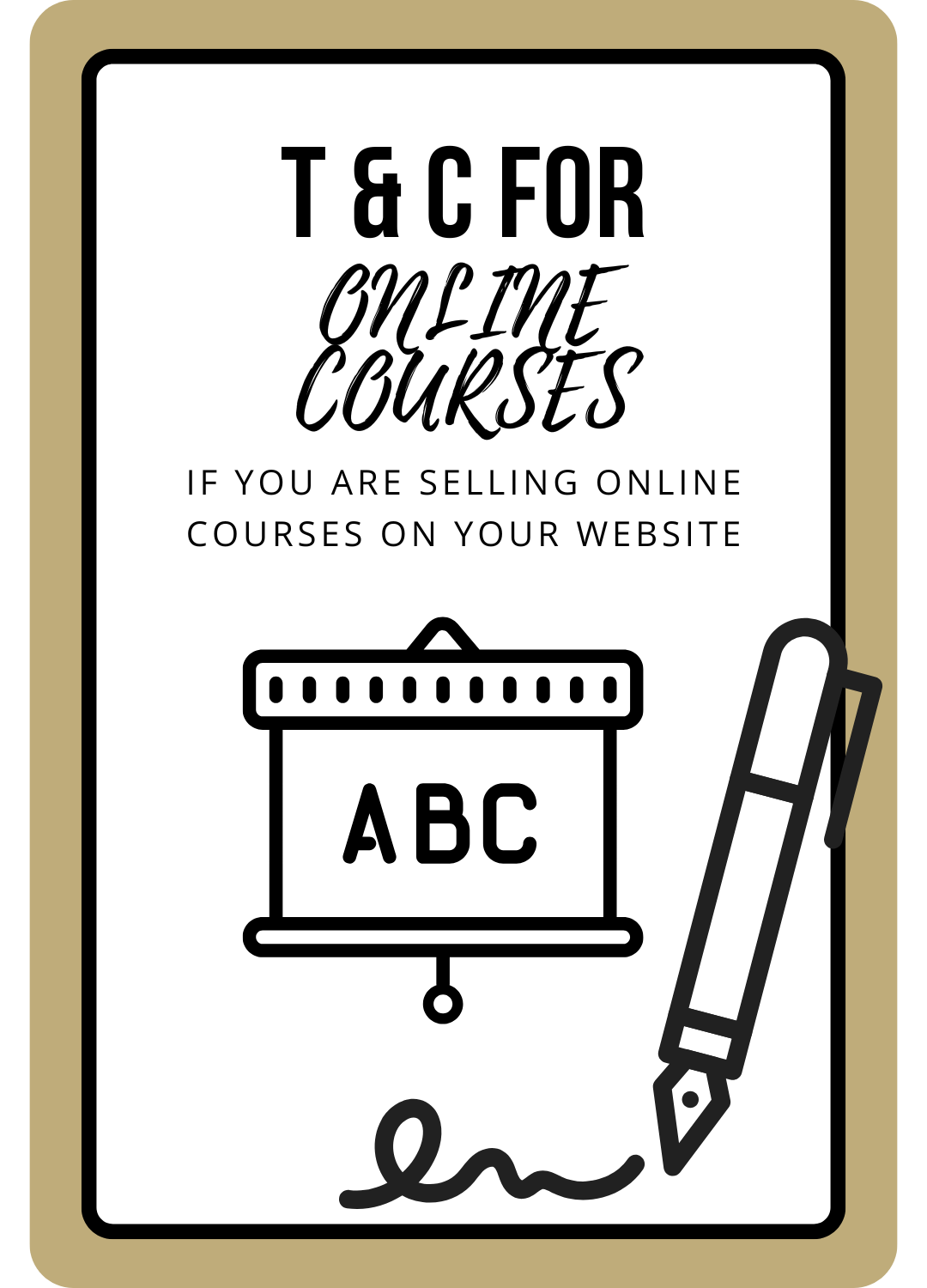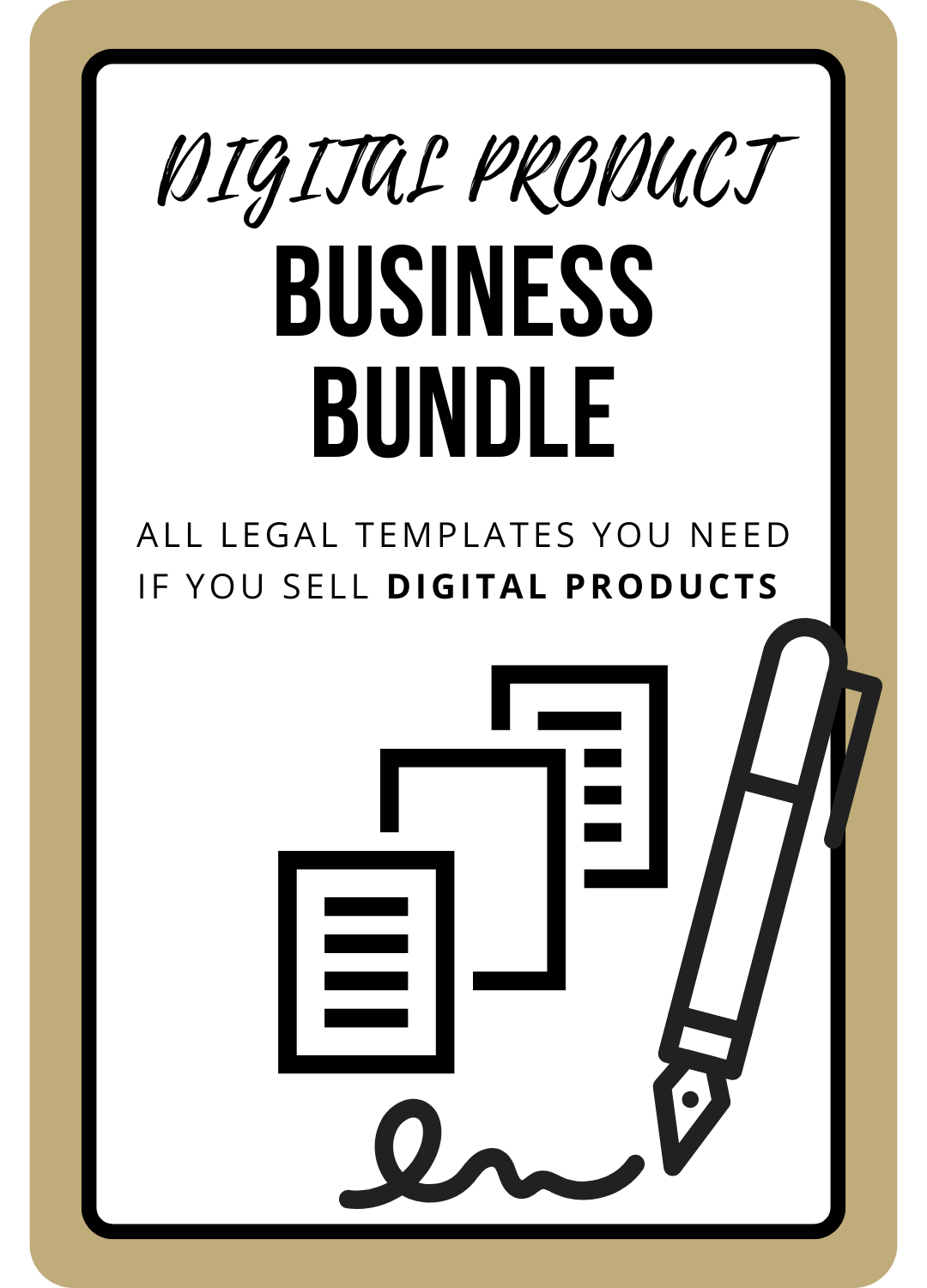11 Must-Haves for Course Terms and Conditions (Protect Against Copycats & Refund Demands)
Wondering how to protect your online course from copycats, freebie-sharers, or refund chasers? Here’s the hard truth: without the right course terms and conditions, all that hard work can be stolen, misused, or challenged by refund chasers who demand their money back after bingeing your lessons.
As a business lawyer who drafts contracts for online entrepreneurs and (course) creators every day, I’ve seen exactly where things go wrong—and how the right online course terms and conditions stop problems before they even start.
That’s why I’m breaking down the 11 must-haves for fluff free course terms and conditions every creator needs in their course agreement to safeguard their content, set boundaries with students, and keep their business stress-free.
👉 And if you don’t want to piece these clauses together yourself, my ready-to-use Course Terms and Conditions Template already includes all of them (and more).
This post is all about the must-haves for course terms and conditions to protect your content, your income, and your sanity.
Ultimate Course Terms and Conditions
The 11 Must-Haves for Your Online Course Terms and Conditions
Let’s get into it! Here’s what your course terms and conditions need to cover.
1. License to Use: Make It Clear Students Don’t Own Your Content
When a student buys your course, they’re not buying your content itself—they’re simply purchasing a license to use it. If you don’t spell this out clearly, you risk students assuming they can do whatever they want with your materials.
Your online course terms and conditions should make the license:
Non-exclusive – you can sell access to as many students as you want.
Non-transferable – students can’t give or sell their access to anyone else.
Non-sublicensable – they can’t “pass on” their license to others while still keeping it themselves.
Limited – students only get the rights you specify, not unlimited control over your content.
Revocable – you keep the right to revoke access if they break your rules.
💡 This clause reinforces your copyright protection and makes sure you stay in control of your intellectual property from day one.
👉 My Course Terms and Conditions Template already includes a ready-made license clause (drafted with legal language that works internationally), so you can skip the guesswork and start protecting your course right away.
2. Protect Your Course from Copycats
One of the biggest risks for course creators is students repurposing your hard work as their own. Without clear restrictions, some may take your content, rebrand it, and even start selling it as a competing course.
Example: A student buys your program, changes the fonts and colors in your slides, and launches a “new” course that looks suspiciously like yours. By the time you discover it, they’ve already enrolled paying students—and you’re stuck trying to prove they violated your rights.
Ironclad, fluff free course terms and conditions should make it crystal clear that:
Your course content is for personal use only
Students cannot use your materials for commercial purposes
Creating competing courses or derivative works with your content is strictly prohibited
💡 This clause ensures your students know your content is off-limits for business use—and gives you a fast, contract-based way to shut down copycats.
👉 My Course Terms and Conditions Template already includes airtight intellectual property protections that stop this problem before it starts.
3. Protect Your Course from the “Charity Bee” (Sharing Is Not Caring)
Not every student is malicious—some just think they’re being generous. They’ll happily hand your login details to a friend, upload your PDFs to a shared Google Drive, or even post modules in a free Facebook group. I call these students the “Charity Bees”—pollinating the internet with your course for free.
Example: A well-meaning student shares your login with two friends. Soon, you notice multiple people accessing your course under the same account. Those “bonus students” never paid you a cent, but they’re getting full access to your hard work.
Your course terms and conditions should explicitly state that:
Students cannot share your course content or materials with third parties
Sharing login details or account access is prohibited
You have the right to revoke access if a student breaks these rules
💡 This clause in your online course contract gives you the power to cut off access when students cross the line—so you’re not funding a free-for-all with your hard work.
👉 My Course Terms and Conditions Template already comes with clear restrictions (and enforcement rights) that protect you against “Charity Bees.”
4. Disclaimers to Protect Against Unrealistic Expectations & Claims
Some students believe that enrolling in your course guarantees success. When they don’t hit the results they imagined, they may turn around and blame you—sometimes even demanding a refund or threatening legal action.
Example: A student buys your marketing course, expecting to hit six figures within three months. When that doesn’t happen, they email you saying the course “didn’t work” and that they want their money back—claiming you promised specific results.
Your online course terms and conditions should include disclaimers that make it clear:
Results depend on the student’s own effort, skills, and circumstances
You do not provide guarantees, warranties, or promises of outcomes
You are not liable for a student’s lack of success or dissatisfaction
But there are more crucial disclaimers you need to include in your training course terms and conditions to protect against risks in your specific niche. For the complete list of course disclaimers you need, read these blog posts:
10 Must-Have Disclaimers for Any Online Course Terms and Conditions
7 Must-Have Niche-Specific Disclaimers for Your Training Course Terms and Conditions
💡 Want these protections without writing a single clause yourself?
My Course Terms and Conditions Template already includes all 11 must-haves we’re covering here—plus extra clauses most course creators forget until it’s too late.
With this ready-to-use template, you’ll:
✅ Keep full control over your course content
✅ Stop refund chasers in their tracks
✅ Set clear boundaries with students from day one
✅ Avoid legal headaches with airtight disclaimers
✅ Save hours of DIY drafting (and skip the stress of “did I get this right?”)
👉 Get the Course Terms and Conditions Template here and protect your course today.
5. Payment Structures: Spell Them Out Clearly
Your students need to know exactly how and when payments will be made. If your terms are vague, you risk confusion—or worse, students missing payments and still demanding access.
Example: A student signs up for your course on a 3-month payment plan, pays the first installment, and then stops paying. Without clear terms, they might argue they’re still entitled to full course access because they “already enrolled.”
Your course terms and conditions should make it clear:
Whether students must pay the full fee upfront or can use an installment plan
When each installment is due (e.g., monthly, bi-weekly, etc.)
Whether full course access is granted immediately or only as payments are completed (Pro tip: restrict access to match payments to protect your income)
What happens if a student misses a payment
That students authorize you to charge their account or card automatically
👉 My Course Terms and Conditions Template includes ready-to-use payment structures you can tailor to your pricing model—so you never have to worry about chasing down unpaid fees.
6. Refunds & Satisfaction Guarantees
Refund policies are one of the trickiest parts of running an online course. Some creators offer a “satisfaction guarantee”, some don’t—but either way, your policy needs to be crystal clear to avoid disputes.
Example: A student binge-watches your entire course in one weekend, then emails you demanding a full refund because “it wasn’t what they expected.” Without a clear refund clause, you may feel pressured to give in—even though they already consumed all your content.
Fluff free course terms and conditions should spell out:
Whether refunds are offered at all (and under what circumstances)
The exact deadline for requesting a refund (e.g., within 14 days)
Any conditions for eligibility (like completing a certain % of the coursework)
How much is refundable (100%, partial, or none, depending on progress)
💡 An airtight refund clause in your training course terms and conditions prevents students from taking advantage of your hard work, even if you do offer a refund (if certain conditions are met), while still keeping your policies transparent and fair.
👉 My Course Terms and Conditions Template already includes a professionally drafted refund policy you can adapt to your business model—so you never have to second-guess if your terms are enforceable.
7. How Long Do Students Have Access?
“Lifetime access” sounds simple, but in practice, it can cause major confusion if you don’t define what “lifetime” actually means. Students may assume they’ll always have access—no matter what happens to your course or business.
Example: A student enrolls in your program today, and five years later, you decide to retire the course. They come back demanding a refund because “lifetime access” should mean forever—when you only meant access for as long as the course existed.
Your online course terms and conditions should clearly state:
Whether access is time-limited (e.g., 12 months, 2 years, etc.)
If you offer “lifetime access,” define what “lifetime” means (course lifetime, your business lifetime, or the student’s lifetime)
That access ends if the course is discontinued
💡 A well-drafted access clause sets realistic expectations and prevents students from demanding compensation long after your course is gone.
👉 My Course Terms and Conditions Template already includes clear, flexible access language you can adapt to your course—so you never get caught in the “lifetime” debate.
8. Course Updates: Do Students Get Them?
Courses evolve over time—you may add new lessons, update strategies, or completely revamp the program. But unless your terms specify how updates are handled, students may assume they’re automatically entitled to every future version for free.
Example: You launch Version 2.0 of your course with double the content and a higher price tag. An old student emails demanding access, claiming “lifetime access” should include all future updates—without paying a cent more.
Terms and conditions for online courses should (but often don’t) clarify:
Whether students will get access to new versions or updates
If updates are included, specify which types (minor tweaks vs. full relaunches)
If major upgrades require an additional fee
💡 A clear updates clause prevents disputes and ensures students know exactly what they’re paying for—without you losing revenue from future versions.
👉 My Course Terms and Conditions Template already includes flexible update language you can tailor to your course model, so students have clear expectations from day one.
9. Bonus Offers & Future Add-Ons
Bonuses are a great way to add value to your course—but if you don’t define how they’re treated in your terms, they can create confusion or even liability down the road.
Example: You add a bonus module as part of a limited-time promotion. Months later, a new student enrolls at full price and demands that same bonus, arguing it was “part of the course.” Without clear terms, you could end up in an awkward back-and-forth.
Your online course terms and conditions should make it clear that:
Bonuses and add-ons are not guaranteed to be included with every purchase
Future bonuses or add-ons are still covered by your terms (so your protections apply)
You reserve the right to change or remove bonuses at any time
💡 A bonus clause protects you from entitlement issues while still letting you use bonuses as a smart marketing tool.
👉 My Course Terms and Conditions Template already includes bonus and add-on provisions, so you can keep your promos flexible without creating future problems.
10. Private Student Groups & Community Access
Many course creators offer a private Facebook group or online community as a “bonus” space for students. While this can be an amazing way to build connections, it can also create headaches if you don’t manage expectations in your course terms and conditions.
Example: A student joins your Facebook group and starts causing drama—spamming other students or posting negative, misleading comments. When you remove them, they demand a refund, insisting that “community access” was part of what they paid for.
Your online course terms and conditions should clarify that:
Private groups or communities are not part of the core course itself
You’re not responsible for what students post in the group
You reserve the right to remove members if their behavior is disruptive
💡 This clause keeps your community drama-free, protects you from liability for student interactions, and prevents refunds being demanded over group access.
👉 My Course Terms and Conditions Template already includes a community access clause, so you can offer groups as a bonus—without getting trapped in group-related disputes.
11. Compliance with Laws (Privacy & Data Protection)
Whenever a student purchases your course, you’re collecting personal information—names, emails, payment details, and login credentials. That means you’re responsible for protecting that data under privacy and data protection laws. If your training course terms and conditions ignore this, you could be opening yourself up to legal risk.
Example: A student from the EU enrolls in your course and later asks how you’re handling their data under GDPR. If your course terms don’t mention privacy or link to a Privacy Policy, you could be seen as non-compliant—putting you at risk of complaints or even fines.
Your course terms and conditions should clearly state:
You comply with applicable privacy and data protection laws
Students agree to your Privacy Policy (always link to it in your terms)
Consent is required when students enroll and create an account
💡 A privacy and compliance clause shows students you take data protection seriously—and shields you from legal trouble and fines.
👉 My Course Terms and Conditions Template already includes this compliance language and links seamlessly with your Privacy Policy, so you’re protected no matter where your students are located. Don’t have a privacy policy? Then grab the Digital Product Business Bundle, which includes the online course terms and conditions template, the privacy policy, and more!
The ULTIMATE Course Terms and Conditions Template
Now you know the 11 must-haves every course creator needs to include in their course terms and conditions. Having these protections in place isn’t just about legal jargon—it’s about making sure your hard work is secure, your students have clear boundaries, and you can run your business without unnecessary stress.
But here’s the thing: drafting all these clauses from scratch takes time (and a lot of second-guessing). That’s why I created my Course Terms and Conditions Template—so you don’t have to.
Why You’ll Love the Course Terms and Conditions Template:
✅ Includes all 11 must-haves we covered here—plus extra protections most creators miss
✅ Written by a lawyer for online entrepreneurs and course creators (so it’s practical, not fluff)
✅ Fully customizable to your course and business model
✅ Covers students worldwide with international-ready legal language
✅ Easy to use—just fill in your details and put it to work immediately
👉 Get the Course Terms and Conditions Template here and protect your course content, your income, and your sanity.
Get Complete Legal Protection for Your Digital Product Business (Beyond Just the Course Agreement)
Your course agreement is only one piece of the puzzle. If you also sell eBooks, downloads, memberships, or other digital products, you’ll need a separate set of protections—because your Course Terms and Conditions Template only covers online courses.
That’s where my Digital Product Business Bundle comes in. This bundle includes both:
The Course Terms and Conditions Template (for your online courses)
The Digital Products Terms and Conditions Template (for all your other digital offers)
Plus, you’ll also get the key website policies every digital entrepreneur needs.
Why You’ll Love the Digital Product Business Bundle:
✅ Covers all your offers—from online courses to eBooks, memberships, and downloads
✅ Includes essential website policies (Privacy Policy, Terms of Use, Disclaimer) so you’re fully protected online
✅ Saves you hundreds compared to buying templates separately
✅ Written in plain English—professional, enforceable, and easy to use
✅ Future-proof: protects your income and content as your business grows
👉 Get the Digital Product Business Bundle here and give your entire digital business the legal foundation it needs.
This post was all about the essentials your course terms and conditions must have to protect your course content & your money.
Learn more about the essentials for your online course terms and conditions:







